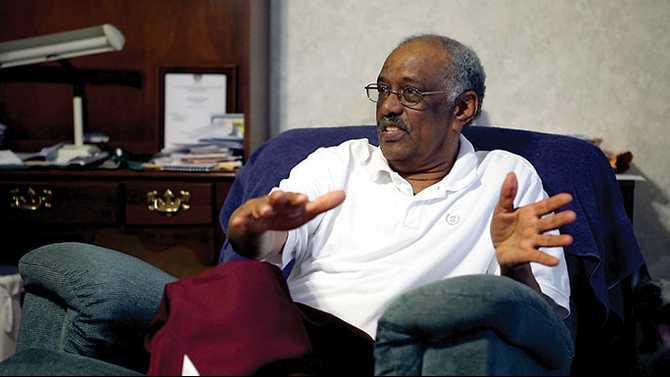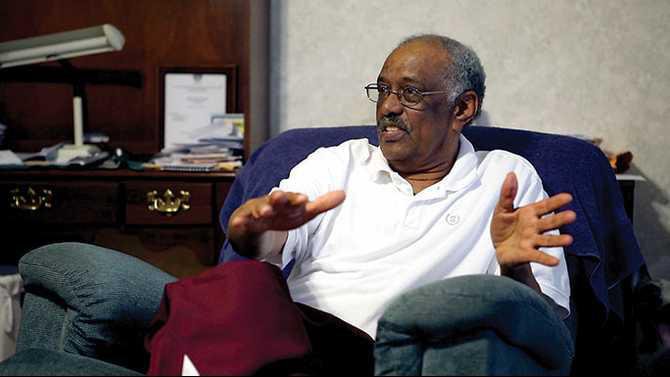Old timers in Rockdale recall vividly—and newcomers are often educated about — the time in 1987 when Cleveland Stroud coached a local boys’ basketball team to a state championship victory.
Yet, in a dramatic twist, the Georgia High School Association stripped Rockdale High of the title, following a surprise revelation that an ineligible athlete had played in a single qualifying game leading up to the big win.
Stroud, the first to learn of the discrepancy, has never questioned his decision to tell the truth—even if it meant forfeiting a hard-earned accomplishment.
That simple act of integrity swirled into a behemoth story that portrayed not only Stroud but also Rockdale County as a place of courage and righteousness amid a culture that promoted winning, no matter the cost.
The recognition netted Stroud a slew of state, national and international honors. Most notably is his International Olympic Committee award, displayed in his home office. It’s nestled atop a modest bookshelf, next to a championship trophy gifted to him by a sympathetic band of Georgia coaches.
There were countless articles written about him in publications such as the New York Times and Sports Illustrated. A Google search reveals Coach Stroud’s honesty also has been a source for sermons and even included in best selling books.
Some 25 years later, Stroud has grown a tad weary of the frequent references to his integrity related to the 1987 championship misfortune.
While peering into the gymnasium trophy case at Rockdale High recently, Stroud quipped: “I am more than basketball.”
Clearly.
“If a kid can’t get anything out of a coach other than a win—that coach is a failure,” Stroud says emphatically. “He doesn’t deserve to be a coach, because coaching is so much more than that.”
Stroud’s long-time friend Charlie Bryant concurs.
Bryant, head coach of the 1984 girls’ championship basketball team, was Stroud’s assistant in 1987.
“He’s had such a positive influence on the young people—counseling them, sharing his wisdom with them and getting up in their face and just telling them, in plain street talk, you know you’re messing up and you need to do this, this and this,” Bryant says.
“I personally see that as a greater picture (of Stroud) than a championship.”
At 14, native Rockdalian Jason Hill was on Stroud’s championship team as one of the younger players. Today, the two maintain a close relationship.
“The way he coached, he treated us all like his kids,” Hill says.
“All of us needed something a little different, and he would tell us what we needed to hear, not always what we wanted to hear. But he was the first to pat us on the back and tell us we did a good job.”
Rod Cole, a star athlete on the 1987 team who went on to play professionally in an international league, has similar recollections.
“Coach Stroud took me under his wings…I was always around (him),” Cole says.
Perhaps it’s his own upbringing that inspired Stroud to extend such compassion to others.
A dedicated father of three and grandfather, Stroud grew up without a dad. He recalls telling classmates his daddy was dead.
“He wasn’t, but he was to me,” Stroud says resolutely.
His father had left him, his brother and mother when Stroud was a baby.
In stark contrast, Stroud softens when talking about his mother, who worked as a domestic before becoming a florist.
“My mama was a strong woman,” he says, his voice cracking from emotion.
“She instilled whatever values I have and she did it alone. She always let us know, if you don’t work, you don’t get anything.”
So, even today, at age 75, the retired Rockdale school teacher and coach, continues to work as a tax preparer and ‘coach to player’ operator for the Atlanta Falcons. Moreover, he’s a city of Conyers Councilman, in addition to maintaining membership at Macedonia Baptist Church and in the service-oriented Rockdale Citizens Progressive Club, among other community commitments.
Stroud has been married to the former Helen Flanigan more than 55 years.
“I’m not the real hero here, my wife is; she did without everything,” Stroud says, referring to earlier in their marriage when he worked multiple jobs and pursued his education at Morehouse College—simultaneously.
He initially enrolled at Morehouse on an academic and basketball scholarship upon graduating high school. Soon after, he married and his wife became pregnant with their first child, so Stroud dropped out of college to take care of his family.
At one point, he worked, at the same time, as a janitor and bus driver for Rockdale Schools. Eventually, he dropped the janitorial job, but picked up work at Lithonia Lighting. It was while watching the monotonous flow of the assembly line that Stroud says he decided to finish what he had started as a teenager.
So, at age 31, while sandwiched between two jobs, he re-enrolled at Morehouse. Stroud averaged three to four hours of sleep nightly, before finally graduating at age 34.
He contends his wife’s support made it possible.
“When you reflect back on this stuff, she didn’t get any new clothes, we didn’t go out for years and years; so without her cooperation, there would be no Cleveland Stroud.” he says with tear-filled eyes.
It’s this type compassion and integrity that has guided Stroud throughout life.
Not surprisingly, even before that fateful game 25 years ago, he often was quoted as saying: “People will forget the score of a basketball game, but they’ll never forget what you’re made of.”
True enough, when each of two game players and two coaches—including Stroud—were asked to cite the final score of that 1987 championship game, none could answer with certainty.
=========================
Old timers in Rockdale recall vividly—and newcomers are often educated about — the time in 1987 when Cleveland Stroud coached a local boys’ basketball team to a state championship victory.
Yet, in a dramatic twist, the Georgia High School Association stripped Rockdale High of the title, following a surprise revelation that an ineligible athlete had played in a single qualifying game leading up to the big win.
Stroud, the first to learn of the discrepancy, has never questioned his decision to tell the truth—even if it meant forfeiting a hard-earned accomplishment.
That simple act of integrity swirled into a behemoth story that portrayed not only Stroud but also Rockdale County as a place of courage and righteousness amid a culture that promoted winning, no matter the cost.
The recognition netted Stroud a slew of state, national and international honors. Most notably is his International Olympic Committee award, displayed in his home office. It’s nestled atop a modest bookshelf, next to a championship trophy gifted to him by a sympathetic band of Georgia coaches.
There were countless articles written about him in publications such as the New York Times and Sports Illustrated. A Google search reveals Coach Stroud’s honesty also has been a source for sermons and even included in best selling books.
Some 25 years later, Stroud has grown a tad weary of the frequent references to his integrity related to the 1987 championship misfortune.
While peering into the gymnasium trophy case at Rockdale High recently, Stroud quipped: “I am more than basketball.”
Clearly.
“If a kid can’t get anything out of a coach other than a win—that coach is a failure,” Stroud says emphatically. “He doesn’t deserve to be a coach, because coaching is so much more than that.”
Stroud’s long-time friend Charlie Bryant concurs.
Bryant, head coach of the 1984 girls’ championship basketball team, was Stroud’s assistant in 1987.
“He’s had such a positive influence on the young people—counseling them, sharing his wisdom with them and getting up in their face and just telling them, in plain street talk, you know you’re messing up and you need to do this, this and this,” Bryant says.
“I personally see that as a greater picture (of Stroud) than a championship.”
At 14, native Rockdalian Jason Hill was on Stroud’s championship team as one of the younger players. Today, the two maintain a close relationship.
“The way he coached, he treated us all like his kids,” Hill says.
“All of us needed something a little different, and he would tell us what we needed to hear, not always what we wanted to hear. But he was the first to pat us on the back and tell us we did a good job.”
Rod Cole, a star athlete on the 1987 team who went on to play professionally in an international league, has similar recollections.
“Coach Stroud took me under his wings…I was always around (him),” Cole says.
Perhaps it’s his own upbringing that inspired Stroud to extend such compassion to others.
A dedicated father of three and grandfather, Stroud grew up without a dad. He recalls telling classmates his daddy was dead.
“He wasn’t, but he was to me,” Stroud says resolutely.
His father had left him, his brother and mother when Stroud was a baby.
In stark contrast, Stroud softens when talking about his mother, who worked as a domestic before becoming a florist.
“My mama was a strong woman,” he says, his voice cracking from emotion.
“She instilled whatever values I have and she did it alone. She always let us know, if you don’t work, you don’t get anything.”
So, even today, at age 75, the retired Rockdale school teacher and coach, continues to work as a tax preparer and ‘coach to player’ operator for the Atlanta Falcons. Moreover, he’s a city of Conyers Councilman, in addition to maintaining membership at Macedonia Baptist Church and in the service-oriented Rockdale Citizens Progressive Club, among other community commitments.
Stroud has been married to the former Helen Flanigan more than 55 years.
“I’m not the real hero here, my wife is; she did without everything,” Stroud says, referring to earlier in their marriage when he worked multiple jobs and pursued his education at Morehouse College—simultaneously.
He initially enrolled at Morehouse on an academic and basketball scholarship upon graduating high school. Soon after, he married and his wife became pregnant with their first child, so Stroud dropped out of college to take care of his family.
At one point, he worked, at the same time, as a janitor and bus driver for Rockdale Schools. Eventually, he dropped the janitorial job, but picked up work at Lithonia Lighting. It was while watching the monotonous flow of the assembly line that Stroud says he decided to finish what he had started as a teenager.
So, at age 31, while sandwiched between two jobs, he re-enrolled at Morehouse. Stroud averaged three to four hours of sleep nightly, before finally graduating at age 34.
He contends his wife’s support made it possible.
“When you reflect back on this stuff, she didn’t get any new clothes, we didn’t go out for years and years; so without her cooperation, there would be no Cleveland Stroud.” he says with tear-filled eyes.
It’s this type compassion and integrity that has guided Stroud throughout life.
Not surprisingly, even before that fateful game 25 years ago, he often was quoted as saying: “People will forget the score of a basketball game, but they’ll never forget what you’re made of.”
True enough, when each of two game players and two coaches—including Stroud—were asked to cite the final score of that 1987 championship game, none could answer with certainty.





